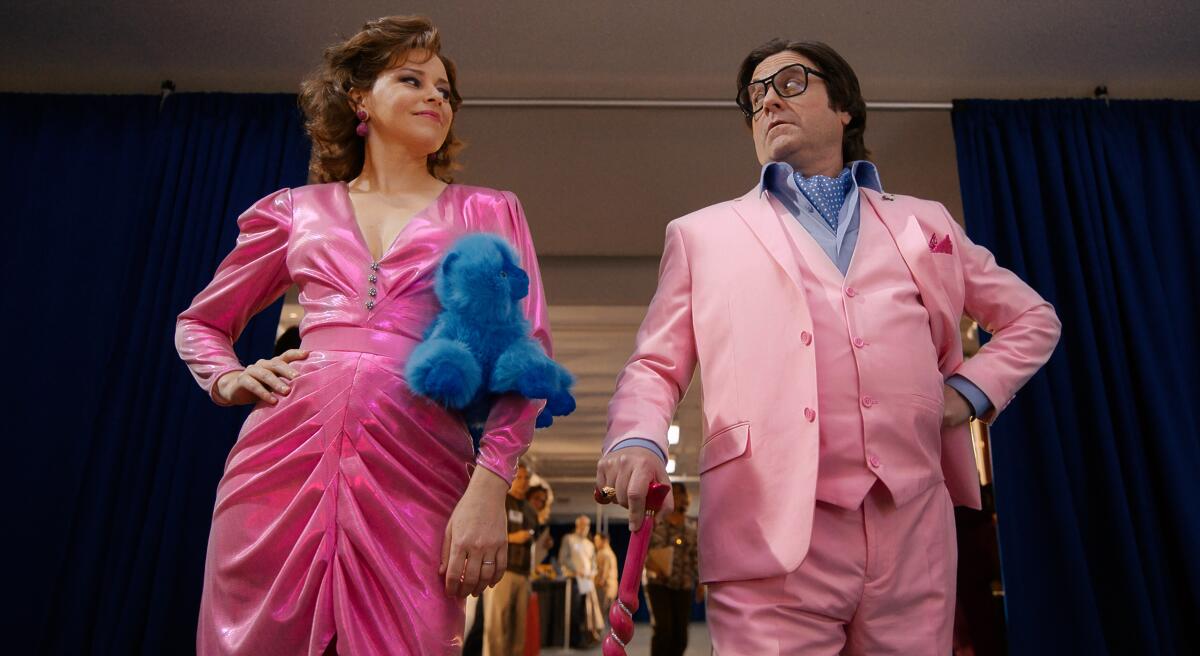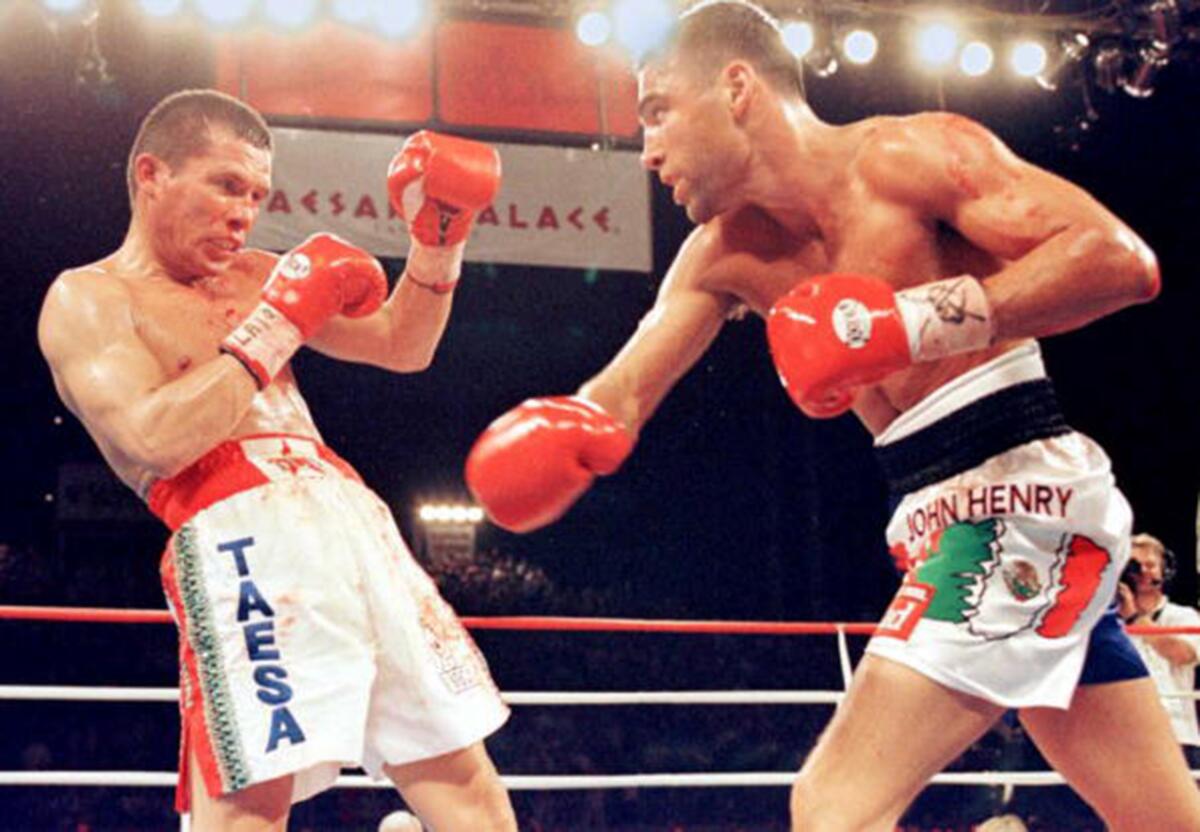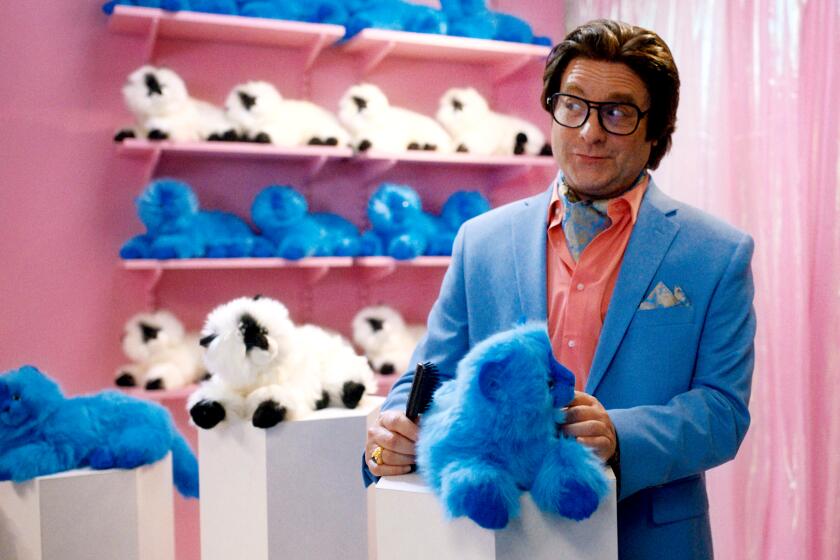Colorful and zippy, ‘The Beanie Bubble’ ultimately feels understuffed

- Share via
‘The Beanie Bubble’
The rise and fall of the 1990s Beanie Baby craze is seen through the eyes of three women in “The Beanie Bubble,” a kaleidoscopic dramedy loosely based on Zac Bissonnette’s book “The Great Beanie Baby Bubble: Mass Delusion and the Dark Side of Cute.” Writer-director Kristin Gore and her husband and co-director, Damian Kulash (the lead singer of the band OK Go), bounce back and forth between the 1980s and ‘90s, spending just as much time revisiting the fashions, music, politics and cultural trends as they do telling their version of the story of the Ty Inc. toy magnate Ty Warner (Zach Galifianakis).
In the film’s first half-hour, all the zooming around adds excitement, re-creating some of the buzz of the Beanie Baby frenzy. The early scenes paint Warner as a benign genius, with a flair for presentation and a knack for making everyone around him feel like a part of a winning team. The scrambled chronology lets Gore and Kulash quickly introduce their three leading ladies: Robbie (Elizabeth Banks), Warner’s on-again-off-again girlfriend and business partner; Sheila (Sarah Snook), a single mother whose kids inspire some of Warner’s best ideas; and Maya (Geraldine Viswanathan), a bright college student who helps Ty Inc. become an internet presence.
Co-directors Kristin Gore and Damian Kulash, along with book author Zac Bissonnette, explain how the ‘The Beanie Bubble’ was shaped from real-life events.
All three women eventually become disillusioned, as Warner proves pathologically unable to share anything — not shares in the business, not the credit for its success, and not his life. At its best, “The Beanie Bubble” is a cautionary tale about how wealth, power and prestige can foster delusions of grandeur, and can insulate people from the their most damaging failures.
“The Beanie Bubble” eventually runs out of steam. The snappy pace and colorful style — so attractive at first — later become alienating, keeping nearly all the characters locked into one dimension. (The lone exception, ironically, is Warner himself, who shows a lot of different facets.) The performances are so lively that not until the second hour is it clear that these women are all going to be defined by how they relate to Warner. There’s still a lot of nostalgic appeal and some enlightening economic theory threaded through this film. But overall, it feels understuffed.
‘The Beanie Bubble.’ Rated R for language. 1 hour, 50 minutes. Available on Apple TV+
‘Susie Searches’
The darkly comic mystery “Susie Searches” starts as an overly broad spoof of true crime podcasters, but it soon deepens into something more twisty and suspenseful than the average satire. Kiersey Clemons plays Susie, a socially awkward college student who escapes from her dreary fast-food job — and the stress of taking care of her sickly mother — by investigating local crimes as an unofficial assistant to the sheriff (Jim Gaffigan). Susie becomes a celebrity when she locates a missing classmate, Jesse (Alex Wolff). The two of them soon begin to bond, and the more they talk, the clearer it becomes that both are hiding secrets.
Writer-director Sophie Kargman (adapting her own short film with screenwriter William Day Frank) uses comedy to misdirect the audience. Early on, Susie — with her prominent braces and her inability to relate to her peers — is made to look silly, as are the various authority figures around her, played by veteran comic actors like Ken Marino and Geoffrey Owens. But about a third of the way through the movie, Kargman and company introduce their first big twist. From there on, the characters become more fleshed-out and grounded.
It’s best to leave that twist unspoiled, except to say that it does complicate any initial impression the audience may have of Susie as an adorable dork. Once we know she’s a less-than-reliable narrator, the time we spend following her amateur sleuthing and podcasting becomes more complicated and tense. The insights into influencer culture and the thirst for fame in “Susie Searches” aren’t exactly fresh. But as a Hitchcockian thriller with a slippery hero, this film can be ruthlessly effective.
‘Susie Searches.’ Not rated. 1 hour, 45 minutes. Available on VOD
‘Sharksploitation’
In the summer of 1975, moviegoers around the world flocked to “Jaws,” a masterfully crafted, big-budget studio version of the kind of “when nature attacks” horror films that had been drive-in staples since the 1950s. In the years that followed, B-movie producers took the “Jaws” phenomenon as a challenge, and saturated the market with cheap movies about killer fish. Decades later, nostalgia for this “skarksploitation” era inspired a wave of winking meta-trash like “Sharknado” and “Sharktopus.”
Stephen Scarlata’s documentary “Sharksploitation” is a fun and far-reaching look back at the history of these movies, including shark-adjacent pictures like “Piranha” and structurally similar land-bound adventures like “Grizzly.” Scarlata strings together interviews with cinema scholars, fans and some of the people who made the films (like the great Roger Corman). They all have the right attitude: They understand the history of schlock and they respect the pleasures of the ridiculous.
There’s perhaps not quite enough meat on the subgenre’s bones to gnaw on for 108 minutes. As is often the case with these kinds of all-encompassing retrospectives, the people Scarlata’s team could persuade to be interviewed end up dictating what gets talked about the most — which for “Sharksploitation” means longer and more repetitive reflections about the recent proliferation of tongue-in-cheek monster movies than coverage of the ‘70s and ‘80s post-“Jaws” boom.
Still, every time this film feels like it’s exhausted all there is to say about goofy shark stuff, Scarlata finds another wild and gory clip, or he gathers another keen insight about why we love being terrified by sea beasts. Like the movies covered within, “Sharksploitation” is undeniably entertaining — especially at its most preposterous.
‘Sharksploitation.’ Not rated. 1 hours, 48 minutes. Available on Shudder
‘Talk to Me’ directors Danny and Michael Philippou explain the movie’s scariest scenes. Watch exclusive clips from the buzzy new A24 movie
‘After the Bite’
Ivy Meeropol’s documentary “After the Bite” is set in and around a Cape Cod town that was rocked by a fatal shark encounter in 2018, and which has since been divided over how best to respond. The answer isn’t as simple as a hiring a crusty old fisherman to track and kill a great white, à la “Jaws.” There are ecological and economic factors at play, and no amount of angry demands at town meetings can thwart the deeper-rooted environmental changes that have brought these sharks to the Massachusetts shores.
“After the Bite” isn’t an overtly activist documentary; it’s more quietly observational. Meeropol and her crew formally interview a lot of people with strong opinions — including fishing boat crews, scientists, historians and lifeguards. But most of the film consists of gentle scenes of these people’s daily lives, peppered with their musings about the state of the planet.
Are the sharks threatening the coastline because they’re hunting for seals, which are a protected species? Are those same seals responsible for devouring all the local fish, at the expense of the fishing business? Or is a warming planet and decades of rapacious human industry to blame for everything? If “After the Bite” ultimately has more questions than answers, it’s only because the film is reflecting the people it’s about, who see existential dangers everywhere and no easy way back to safety.
‘After the Bite.’ Not rated. 1 hour, 28 minutes. Available on Max
‘The Golden Boy’

Of all the types of sports documentaries, boxing ones tend to lean hardest into tragedy and heartache. That’s often the case with Fernando Villena’s “The Golden Boy,” which doesn’t shy away from the darker side of its subject, the Olympic gold medalist, multi-time pro champion and entrepreneurial boxing promoter Oscar De La Hoya. Born in East Los Angeles to Mexican immigrants, De La Hoya was a star at an early age, not just because of his prowess in the ring but because he was a stunningly handsome, charming kid who dedicated his career to his late mother. But with wealth and fame came scandals, including substance abuse and accusations of sexual assault. (His company, Golden Boy Promotions, issued a statement at the time denying the allegations.)
Villena’s film is ostensibly about the disconnect between De La Hoya’s initial public image and his later reputation; but that’s a tricky dichotomy to explore, and “The Golden Boy” often seems at a loss for how to encapsulate both everything fans loved about De La Hoya and everything he was alleged to have done wrong. De La Hoya himself is interviewed extensively throughout this two-part documentary, and though he talks openly about his struggles and his shame, he always keeps his guard up a little.
So “The Golden Boy” will likely appeal most to boxing fans, due to the wealth of vintage footage Villena has of De La Hoya in action — both beating up his competition and looking fabulous on TV. There’s not a lot of nuts-and-bolts boxing strategy discussed here, but there is much about how difficult it can be to manage huge sums of money, a complicated family life, and the hopes and dreams of millions of Mexican Americans, all at once.
‘The Golden Boy.’ Not rated. 2 hours, 35 minutes. Available on Max
‘Happiness for Beginners’
In writer-director Vicky Wight’s adaptation of Katherine Center’s novel “Happiness for Beginners,” Ellie Kemper plays Helen, a recent divorcée who tries to forget her troubles by signing up for a “hiking for beginners” tour of the Appalachian Trail. When the trek turns out to be longer and tougher than she expected, the perpetually fussy Helen is pushed to let go of her hang-ups, find some inner strength and learn to trust other people — especially Jake (Luke Grimes), a sweet guy she’s always resented, because he’s her obnoxious brother’s friend.
In other words, “Happiness for Beginners” is a little like the Cheryl Strayed “lessons learned in the woods” biopic “Wild” — and a lot like one of those made-for-cable movies where an uptight woman finds her true passion after spending time with a down-to-earth man. Ultimately, the film’s formulaic qualities are too much of a drag. Wight and her cast generate some good comic chemistry at the start of the hike, when Helen and Jake join a band of good-natured misfits who have little in common but learn to work together. Later though, the comedy dissipates as character after character experiences some personal revelation — complete with a maudlin monologue. This movie’s heart is in the right place, and its company is pleasant enough. But by its final half-hour, it starts to feel too much like a rote recitation from a rom-com to-do list.
‘Happiness for Beginners.’ Rated TV-14 for language. 1 hour, 43 minutes. Available on Netflix
Available now on DVD and Blu-ray
“Soundies: The Ultimate Collection” is a treat for fans of cinema and music history, collecting 200 of the short musical films that used to play in special jukeboxes at bars and arcades across the country in the 1940s. These early music videos showcased icons like Cab Calloway, Duke Ellington, Liberace and Sister Rosetta Tharpe. Kino’s four-disc set (produced in cooperation with the Library of Congress) includes introductions and interviews that help explain and enhance a unique moment in American popular culture. Kino Classics
More to Read
Only good movies
Get the Indie Focus newsletter, Mark Olsen's weekly guide to the world of cinema.
You may occasionally receive promotional content from the Los Angeles Times.












